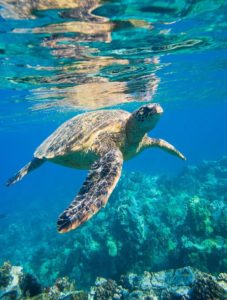Protecting Our Oceans While Living in the Desert
Take Action on Plastic Pollution!
For most of us living in the Sonoran Desert, the ocean may not always be on our minds, but did you know that our everyday actions affect the oceans around the world? Here’s how you can help protect them:
 Say No to Plastic: Each year 8 million tons (that’s about 8 million cars worth) of plastic end up in the oceans around the world. Plastic is a strong substance so it takes a long time to break down. This plastic is sometimes mistaken for food by sea turtles and other marine animals. Additionally, when plastic does start to break down it becomes tiny, microscopic particles that are accidentally eaten by all sea life. Recycling is a great way to reduce the amount of plastic going into the oceans but an even better solution is to not use to plastic at all.
Say No to Plastic: Each year 8 million tons (that’s about 8 million cars worth) of plastic end up in the oceans around the world. Plastic is a strong substance so it takes a long time to break down. This plastic is sometimes mistaken for food by sea turtles and other marine animals. Additionally, when plastic does start to break down it becomes tiny, microscopic particles that are accidentally eaten by all sea life. Recycling is a great way to reduce the amount of plastic going into the oceans but an even better solution is to not use to plastic at all.
Choosing not to use plastic products designed to be used only once and then thrown away (such as: straws, plastic bags, water bottles) can help save over 100 million marine animals affected by plastic garbage each year. Here are some tips to help you say no to single-use plastic:
- Drink water out of a reusable water bottle that is made from recycled plastic, glass or stainless steel
- Use reusable bags when shopping instead of plastic grocery bags
- Use a reusable sandwich bag rather than a plastic sandwich bag
- Sip water directly from the glass, instead of using a straw
- Attend Summer Safari Nights at the Zoo on June 8, June 29 or July 20 to purchase a “Go Green” kit from our teen volunteers. This kit includes a reusable straw and sandwich bag for you and a veggie bag for your parents to use when shopping.
Watch what you eat: Do you enjoy eating salmon, crab, and other types of seafood? If so, you can easily protect the oceans by carefully selecting what seafood you eat. Fish populations around the world are declining due to fishing practices that are not eco-friendly. To protect the oceans and fish populations, download the Seafood Watch® app onto your phone. This app will let you know what types of fish are OK to eat without negatively affecting our oceans and which ones you should avoid eating.
Photo credit: World Oceans Day
